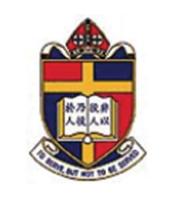| Language Policy |
Chinese is used as the medium of instruction in our school. To enhance students’ English language skills, students from all forms participate in English-medium Learning Extension Activities across all subjects and phonics is taught in class. Our school also provides plenty of opportunities for students to use English for purposeful communication both inside and outside the classroom through a wide range of activities, which include English assemblies, the Speech Festival, English song dedication and English speaking weeks. There is an English Self-learning Centre for students to improve their English performance through self-study. |
| Learning and Teaching Strategies |
1. Small class teaching is practised to cultivate and strengthen interpersonal skills in the classroom and enhance the support for individual students.<br>2. IT is used extensively in the teaching and learning experience to foster students’ motivation and better engage them in self-directed learning.<br>3. Previewing activities are designed to foster student motivation and cultivate a positive attitude towards learning. <br>4. Collaborative teaching strategies like peer observations and joint lesson planning to enhance the effectiveness of teaching.<br>5. Life-wide learning and project learning are implemented. Visits and field trips are also organised to enrich students’ knowledge and help them develop the nine generic skills. <br>6. To broaden students' horizons, study tours to Korea, Taiwan, Guilin and Guangzhou were organised, with over 200 students participating. Additionally, study tours to Okinawa, Zhengzhou, Luoyang, Wuhan, Shaoguan, Xiamen and NanSha will be implemented during the academic year of 2023-2024. <br>7. A diversified school curriculum has been introduced in junior forms to develop a broad and comprehensive perspective for students. |
| School-based curriculum |
1. Electives: 2X. <br>Our school offers five elective subjects for both X1 and X2 and there are no fixed combinations. <br> <br><br> 2. Curriculum highlights: In junior forms, many subjects offer school-based curriculums to cater for our students’ learning needs. Tailor-made teaching materials on Career Planning and Moral and Civic Education are used in the Form Teacher Periods. In Senior forms, comprehensive learning is established to enrich students' learning experiences. The themes include "Environmental Education", "Career Planning", "Arts Education", "Financial Education", "STEM Education" as well as "Physical Education". |
| Approach to Catering for Learner Diversity |
Tutorial classes are organized for junior form students to consolidate their learning and after-school support is provided for senior form students to prepare for the HKDSE. Tailor-made teaching materials are designed to meet the needs of diverse learners. |
| Approach to Integrated Education |
Under the "Whole-School Approach" to integrated education, the Student Support Team has been formed to support students with special educational needs. On top of that, teachers attend relevant training events in order to enhance their ability to cater for individual differences.<br>Thanks to the Learning Support Grant, NCS-SEN Grant and other available resources, a wide variety of support strategies are adopted to help students with special educational needs. Remedial classes, exam revision classes, social groups and interest classes are organized to cater for their needs when it comes to academic performance, social skills and life planning. At the same time, school-based speech therapy and funded services such as occupational therapy are provided for students that need them.<br>Taking into account SEN students’ individual differences, teachers endeavour to enhance their learning outcomes through curriculum design, diversified teaching, differentiated learning materials as well as homework and exam modifications. To facilitate early identification, members of the Student Support Team will meet all the S1 students and their parents during S1 registration. Their first semester test results and class performance are also closely monitored.<br>The school works closely with the school-based educational psychologist to conduct meetings and assessments on a regular basis. Individual Education Plans are developed for students in need and there are review meetings to evaluate their effectiveness. Importance is also attached to home-school cooperation. Parent workshops will be conducted so that the school and parents can join hands in supporting students’ learning and growth. |
| Education Support for Non-Chinese Speaking (NCS) Students |
|
| Home-School Co-operation |
The PTA is committed to working in partnership with parents to support and enrich the school life of our students. The PTA has fostered close ties between parents and teachers through a range of annual activities. |
| School Ethos |
Nurturing students to develop positive, compassionate and caring traits is our priority. We adopt a whole school approach to guidance and discipline to promote the moral, intellectual, physical, social and aesthetic development of students within a harmonious and caring school culture. Students are also actively encouraged to support charities and take part in voluntary work both in school and in our local communities in accordance with the School motto, ‘To serve but not to be served’. In 2020, the total amount of time our students spent on voluntary work was 12108 hours and 53 students were awarded Certificate of Appreciation by the Social Welfare Department. |
| School Development Plan |
1. Our school focuses on helping students reach their potential, fostering their leadership skills and instilling positive values in them through various activities within the school and the broader community.<br><br>2. Our school facilitates self-directed learning to nurture students’ motivation and engagement in learning. |
| Teacher Professional Training and Development |
Our school aims to organize three professional development days for all staff annually. Besides, all school committees and departments will provide professional development opportunities for their members to enhance teachers’ professional knowledge and enrich their teaching practice. |
| Life-wide Learning |
There are 20 school clubs to help students achieve the aims of whole–person development and enable them to develop the life-long learning capacities needed in our ever-changing society. |
